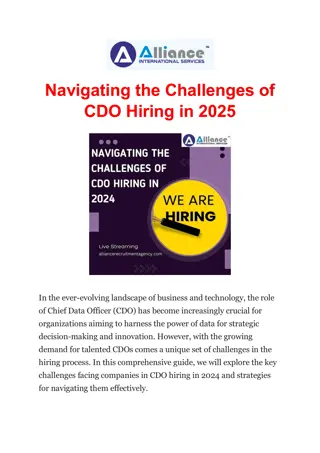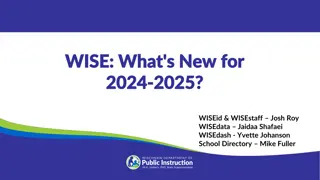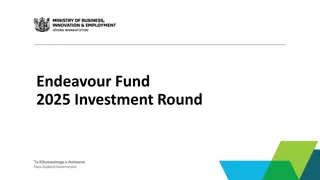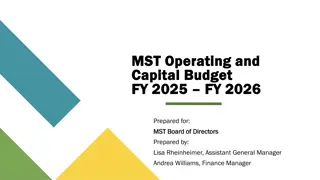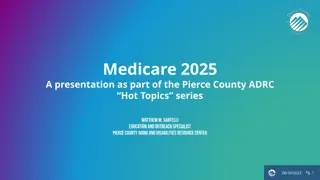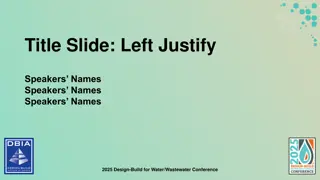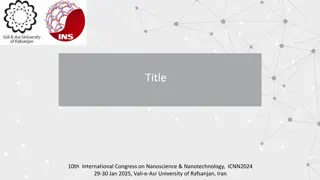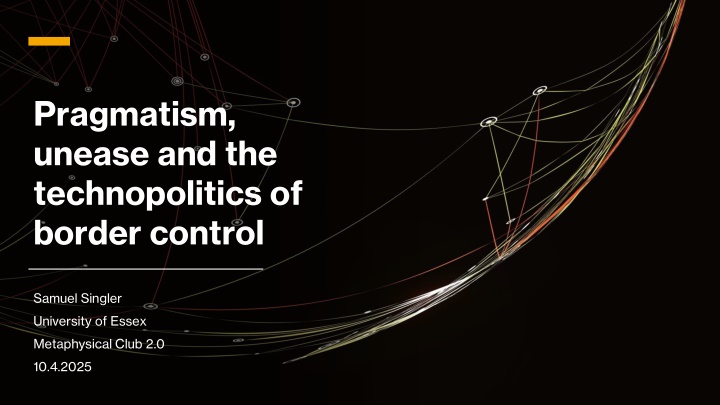
Technopolitics of Border Control and Pragmatist Inquiry
Explore the intersection of pragmatism, unease, and the technopolitics of border control through the lens of critical criminology. Delve into the significance of technology, humanism, and the MIDAS case study while addressing the contested status of humanism and the role of inquiry in navigating complex technopolitical landscapes.
Download Presentation

Please find below an Image/Link to download the presentation.
The content on the website is provided AS IS for your information and personal use only. It may not be sold, licensed, or shared on other websites without obtaining consent from the author. If you encounter any issues during the download, it is possible that the publisher has removed the file from their server.
You are allowed to download the files provided on this website for personal or commercial use, subject to the condition that they are used lawfully. All files are the property of their respective owners.
The content on the website is provided AS IS for your information and personal use only. It may not be sold, licensed, or shared on other websites without obtaining consent from the author.
E N D
Presentation Transcript
Pragmatism, unease and the technopolitics of border control Samuel Singler University of Essex Metaphysical Club 2.0 10.4.2025
Key takeaways Pragmatism as a research paradigm Or meta-method (Pihlstr m, 2024) Pragmatism as a theory of technology Technical experts as epistemic agents (Chang, 2022) Inquiry into values and purposes (Rydenfelt, 2025)
Outline Why technology matters A case study: MIDAS The contested status of humanism Unease, doubt, and inquiry A new way forward? A pragmatist theory of technology Exclusion, solutionism, and crimmigration control Accountability and democracy in critical criminology
Why technology matters The digital revolution (Balbi, 2023) Mundane tools shape criminal justice practices, laws, and ideas (Goold et al., 2013) Function creep (Dekkers, 2020) Technopolitics (M ller & Richmond, 2023)
A case study: MIDAS Migration Information and Data Analysis System Developed by the UN- affiliated International Organization for Migration Global hierarchies: political influence, technical expertise, mobility
The contested status of humanism Moving beyond instrumentalism and determinism Posthumanism: actor-networks, assemblages, and the vitality of matter (Bennett, 2010) Critiquing humanism (Braidotti, 2013) Losing sight of politics? (Lemke, 2018; Singler, 2023)
Unease, doubt, and inquiry Doubt regarding habits of action launches inquiry (Pihlstr m, 2022) Empirical and normative inquiry (Rydenfelt, 2025) A problematic situation : MIDAS as part of the the EU s strategy in the war on migration (Privacy International, 2019)? Unease as a motivation of technopolitical inquiry (Singler, 2025)
A new way forward? A pragmatist theory of technology Technology as the development of tools to solve perceived social problems (Hickman, 2001) New tools lead to the revision of habits and purposes (Rydenfelt, 2017) Border control experts as epistemic agents (Chang, 2022) Re-politicizing technology through self-critical humanism (Pihlstr m, 2021)
A new way forward? A pragmatist theory of technology What perceived social problems prompted inquiry into new technologies? What existing habits, tools, and ideas shaped these problem formulations? When were crucial design decisions made, and by whom? How did new technologies reshape practices, perceptions, and purposes?
Exclusion, solutionism, and crimmigration control Curbing irregular migration flows to Europe (Interview, 9.3.2021) Data, data, it s all about data. And showing other states that you have the tools to collect it (Field diary, 26.8.2021) Usually it s not the role of international organizations to draft laws for countries but if we don t do it, it s just not going to happen (Field diary, 5.8.2021) What s most important is to make sure the systems are working properly. The data need to be globally interoperable (Field diary, 5.8.2021)
Accountability and democracy in critical criminology Contesting technological solutionism and expertise Expanding the community of inquirers: Southernizing criminology Self-critically assessing our values: Decolonizing criminology Meliorism and fallibilism in empirical and normative inquiry
Thank you Outsourcing Crimmigration Control: Digital Borders, the IOM, and Biometric Statehood (Oxford University Press). Out in July 2025 It s free! (Open access)
References Balbi G (2023) The Digital Revolution: A Short History of an Ideology. Oxford: Oxford University Press. Bennett J (2010) Vibrant Matter: A Political Ecology of Things. Durham, NC: Duke University Press. Braidotti R (2013) The Posthuman. Cambridge: Polity Press. Chang H (2022) Realism for Realistic People. Cambridge: Cambridge University Press. Dekkers T (2020) Technology driven crimmigration? Function creep and mission creep in Dutch migration control. Journal of Ethnic and Migration Studies 46(9): 1849 1864. Goold B, Loader I and Thumala A (2013) The banality of security: The curious case of surveillance cameras. British Journal of Criminology 53(6): 977 996. Lemke T (2018) An alternative model of politics? Prospects and problems of Jane Bennett s Vital Materialism. Theory, Culture & Society 35(6): 31 54. Mu ller F and Richmond M (2023) The technopolitics of security: Agency, temporality, sovereignty. Security Dialogue 54(1). 1: 3 20 Pihlstro m S (2021) Ihmisen maailma: Esseita humanismista, totuudesta ja ajattelun tilasta. Tampere: niin & na in. Pihlstr m S (2022) Toward a Pragmatist Philosophy of the Humanities. New York: SUNY Press. Pihlstr m S (ed.) (2024) The Bloomsbury Handbook of Pragmatism. London: Bloomsbury Academic. Privacy International (2019) New report underlines the EU s strategy in the war on migration: Border externalisation. Available at: https://privacyinternational.org/news- analysis/3224/new-report-underlines-eus-strategy-war-migration-border- externalisation (accessed 29 September 2024 . Rydenfelt H (2017) Habits, purposes and pragmatism. In M Svantner and V Gvodiak (eds.) How to Make Our Signs Clear: C. S. Peirce and Semiotics. Leiden: Brill, pp. 21 35. Rydenfelt H (2025) Inquiring value: The pragmatist turn in business ethics. Journal of Business Ethics, 197: 1 11. Singler S (2025) Outsourcing Crimmigration Control: Digital Borders, the IOM, and Biometric Statehood. Oxford: Oxford University Press.


